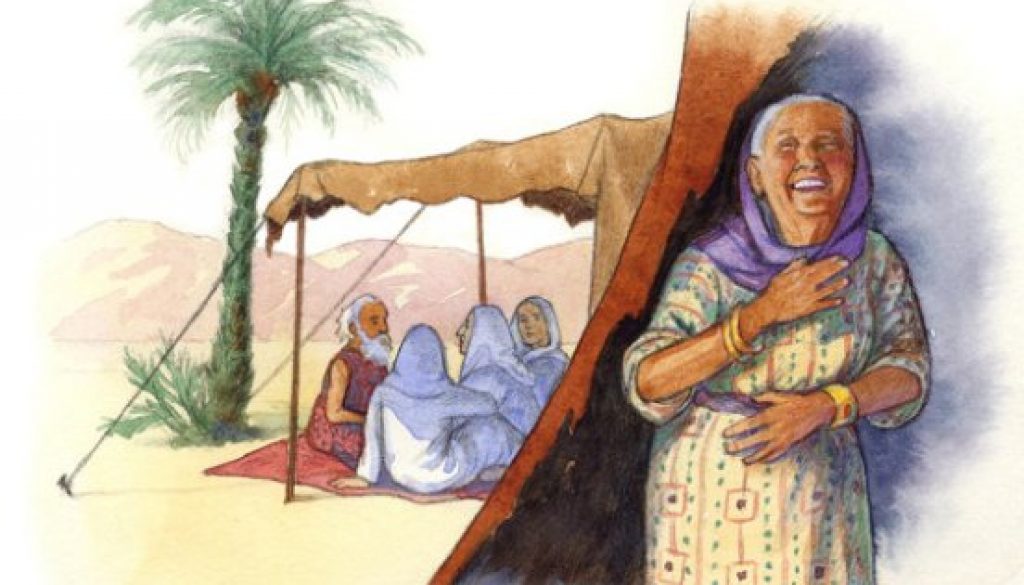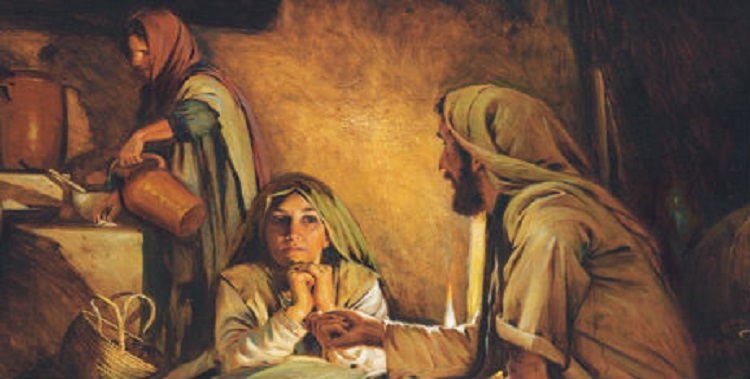|
What a wonderful couple of readings we have today. In the Genesis passage, Abraham and Sarah are being told again, as it is also mentioned in Genesis 17, that they are going to be parents. Sarah is 90 and Abraham is 100, so the improbability of this occurrence made them laugh. When their son is born, they name him Isaac, which means “He laughs”. There is a certain joy about God being able to do the impossible, and it is always good to hold on to the fact that where God is concerned, anything can happen, even in the most unlikely situations. The story also involves three strangers and the hospitality bestowed upon them, which was part of Middle Eastern culture. There is no sense of rushing, and roles are clearly defined. Sarah, as a woman, is the cook, so Abraham wishing to fulfil the cultural norm of hospitality tells her to bake some bread with 39 pints of flour. This is not a simple operation and will take a lot more than a few minutes, as will the cooking of the calf, which has to be chosen, killed, butchered and cooked. All of this will take some time. As we transport ourselves back three thousand years, we become emersed in the culture. This is not hospitality on the quick; this is not going into a restaurant and getting annoyed if the meal does not turn up within 10 minutes of ordering. This is a special event that will take time: time for them to enjoy each other's conversation, swap stories, and get to know one another. The hospitality in the first reading leads us into the well-known story of Martha and Mary. This pericope should be read alongside last week’s lectionary reading of the Good Samaritan. The Good Samaritan was an example of loving your neighbour, and the story of Martha and Mary is an example of loving God with all your heart, soul and strength. Let us take ourselves into the home of Martha. She has invited Jesus and is the perfect host, offering hospitality. But in busying herself, there appears to be a conflict with her sister Mary, who wishes to sit at Jesus’ feet to hear his words. We are on radical grounds here. The role of women was not to listen to teachers and rabbis but to serve and be in the background. Sarah, within the story of Genesis, is a good example, but here is Mary ignoring convention and wishing to learn. As an aside, this event is also captured in the Gospel of John, 12:1-11, but in that version, we have Lazarus reclining, Martha working, and Mary anointing Jesus’ feet. Luke chooses not to capture that scene but to focus on the tension between the roles of these two sisters. Indeed, this is a microcosm of what was happening in early Christian society. What was the role of women? Were they to be disciples? Were they to learn and then keep quiet? Was their role just to serve others? Now, in Luke, it is quite clear that both listening and doing are important. We just need to look at Luke 6:47, Luke 8:15, 21 or Luke 11:28 to understand that Luke is emphasising that you need to hear the word and then obey. To hear the word and then put it into practice. To hear the word and then build your house upon the rock. It is a story of distractions and priorities. Where is God in our list of priorities, and what gets in our way? Do we become so busy that we forget to listen to God and put God's words into action? It is a story that prompts all these questions and challenges us. Luke's gospel has an emphasis on hearing and doing, but John's gospel has an emphasis on strong women. Similarly, the Book of Acts, written by Luke, has many stories of women in the early Christian faith being essential to the development of this new religion. People like Dorcas (Acts 9:36-43), Lydia (Acts 16:14-15), and Priscilla (Acts 18:1-4, 24-26). The question concerning the role of women is heard in this story from Luke, and was debated then as it is debated today. Martha and Mary demonstrate the tensions between learning and doing, but one is not better than the other. We can ask are we Mary-type people or Martha-type people if we wish, but we must never say that one is better than the other because they are both essential. In talking to Martha, Jesus mentions her name twice. “Martha, Martha,” he says with compassion and gently shows Martha that Mary’s decision to listen is as valid as the role of the host. Whilst Mary has a key role in the story, we must never forget the importance of Martha. Her profession of faith in Luke 11:35-7 where she says, “I believe that you are the Christ, the son of God who has come into the world,” is as important as Peter's profession of faith in Mark 8. I believe the word "Martha" in Greek means she was rebellious, so never underestimate Martha's role in the early Christian church. She was vital. It was Martha that called Jesus to bring Lazarus back to life. So these verses in Luke offer us great riches to explore and understand. The underlying thing to remember is the connection with the Good Samaritan and that this story shows you listen and love God, then act upon those words. Paul emphasises faith, the apostle emphasises action and deeds. This story brings all this tension together and reminds us that you have to listen before you know what to do. This sermon was originally preached at Gants Hill URC by Rev'd Martin Wheadon on 17th July 2022.
1 Comment
|
©Copyright
We are happy for you to use any material found here, however, please acknowledge the source: www.gantshillurc.co.uk AuthorRev'd Martin Wheadon Archives
June 2024
Categories
All
|


 RSS Feed
RSS Feed